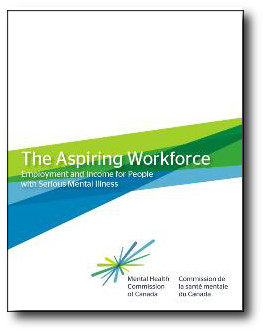The Aspiring Workforce study commissioned by the Mental Health Commission of Canada is divided into four sections. An examination of the first two sections was published in the last issue of Mental Health Notes.This edition of Mental Health Notes will explore the remaining sections: social business environmental scan and mental health know-how in the workplace. Social Businesses
An environmental scan was conducted to identify social businesses that employ people with mental illness across Canada. It also includes in-depth case studies of six longstanding social businesses.
The environmental scan identified about 100 social businesses operating across the country; many of them concentrated in a select number of provinces and large cities. These businesses hired 1,500 workers in total, mostly on a part-time basis. The businesses were open for trade in the community; had by-laws; were striving for financial sustainability; and had social missions that included hiring or training of persons identified as having a mental illness. (A full list of these businesses is in Appendix G).
The Aspiring Workforce study examines subsidy structure, payment structure and revenues, business type and mandate. Promising practices and challenges are identified and 12 recommendations to policymakers and other stakeholders are included with a goal to seeing social business as a viable employment option for persons with mental health conditions.
Some of the report’s key messages for policymakers include:
- creating a formal network of social businesses to advance consensus standards and knowledge.
- the need for public policies to support the dissemination and sustainability of social businesses and enable the full participation of people with mental illness.
- the need for training and research initiatives to advance best practices in the field.
- policy analysis to consider the impact of government disability income and other entitlements or pensions on individuals in the business.
- the need for a conceptual framework to guide the development of social businesses as models of social inclusion.
Workplace Know-How
The Aspiring Workforce project defines “workplace know-how” as the knowledge and skills that people with serious mental illness need for the creation of a working life, including finding and keeping work, and ongoing career and educational development. This section of the report explores the services and resources that are available and those that are needed to ensure job retention and career-building for persons with mental health conditions.
In addition to a review of literature on the subject, 323 questionnaires were completed by job seekers and those currently employed. Almost 90 percent of the sample reported being in-and-out of work in the last 10 years, with either long (66.7 percent) or short (22.6 percent ) gaps between jobs. There was a high level of dissatisfaction with their jobs and a general sense that they were at risk of losing their current job.
The study found there were 12 key organizational resources needed to ensure job success and guard against long-term unemployment, including:
- The ability to self-evaluate strengths and weaknesses and identify what training they need.
- Self advocacy (knowledge of rights in the workplace).
- Symptom and illness management (understanding triggers, medication management, self-help strategies, and being aware of available mental health services and supports).
- And understanding employer (willing to provide work accommodations)
- Conventional skills (a need for financial literacy and ability to explain long absences for workforce)
- Career development (60 percent of respondents identified further training as a top need)
See “The Aspiring Workforce: Employment and Income for People with Serious Mental Illness,” available at www.mentalhealthcommission.ca.
